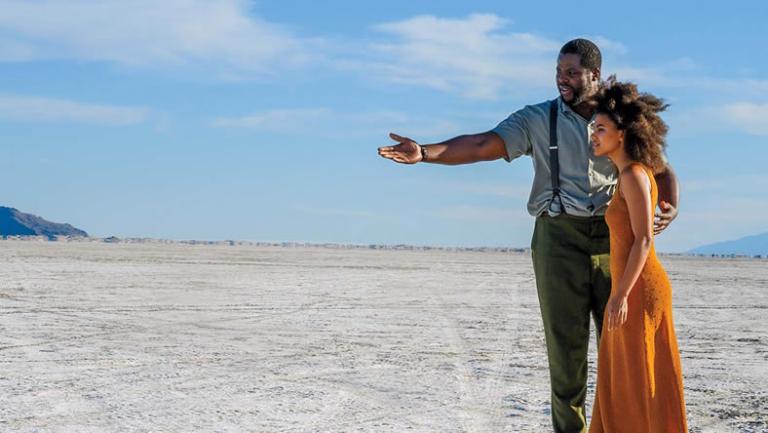
The ancient Greeks believed that the gates of the underworld—the land of the dead—was guarded by the great three-headed dog Cerberus. He makes sure that no dead soul leaves this gray, shadowed world. And he ensures that few living go through those gates.
Life’s journey ends at Cerebus’ gate, where does it begin? And might there be a gate there, too?
In Nine Days, a flower of a film written and directed by Edson Oda, there is a gate of sorts. And Will holds its key.
Will (played by the understated, amazing Winston Duke) spends eternity in modest house in a land of sand and sky. Here, lives plays out on a bank of televisions in Will’s dark living room, each screen playing out a different person’s days and months and years. Will watches them all, paying special attention to some, taking notes now and then.
But when the images on a screen flicker out—and when the person dies on the other end—Will’s job really begins. Prospective souls find their way to his front porch, knock on his door and take part in a mystical selection process, an interview for existence that lasts nine days.
“You are being considered for the amazing opportunity of life,” he tells each applicant.
The film hooked me with that line. And it never let go.
Rated R for language, Nine Days is as much a poem as it is a movie—an existential ode to the prickly problem of being. And while it never mentions God or religion, it’s deeply spiritual and it concerns itself with questions of meaning and purpose, tugging at the Gordian knot of life’s beauty and pain.
For Will, life is pain—despite his sales pitch to the prospective lives that come through his door. We learn he once lived—the only one we meet who can say so—but his life didn’t go so well. How it ended, we’re never explicitly told. But the movie suggests he eventually … opted out; he didn’t have the stomach for life’s terrific challenges.
So when one of his screens goes dark unexpectedly—a promising violinist crashes her car into a wall—Will suspects the worst. He’s determined to pick a soul who’ll be tough enough to withstand life’s blades and bombs. “You always talk as if you’re sending them off to war,” says Kyo, Will’s only real friend and workmate. And Will indeed sees life as a thing to be fought and endured and conquered.
“I send flowers and other people send pigs to eat them!” he shouts. But one of the souls sees something else.
“You’re afraid,” she says. “And you want everybody else to be afraid too, is that it?”
I can be a lot like Will. Maybe we all can.
Life is filled with pain, with fear, with grief. We see it splashed on Will’s television screens: A boy is bullied every day. A man is shot in the gut. A woman—with a beautiful gift and a whole life ahead of her—is killed, either as part of a terrible accident or by her own hand. We see it in the Souls Will weighs, too. A man draws beautiful pictures he’s afraid to show. A woman expresses a forbidden love and finds herself damned for it.
“Every single day, someone hurts someone else,” a soul named Kane says.
“Why are you focusing on that?” says Emma.
“Why are you not?” Kane shoots back.
Even though Nine Days isn’t explicitly religious, I wonder if director Edson Oda means to remind us of the story of Cain and Abel through Kane and Emma.
In the biblical tale, of course, Cain and Abel both offer gifts to God; Cain an offering of grain, Abel the firstborn of his livestock. God rejected Cain’s offering, but accepted Abel’s—sending the elder brother into a jealous rage. Cain killed Abel, and God banished him east of Eden, to the land of Nod.
Though the biblical narrative is short, we can’t help but form an impression of these two brothers: Cain, hard and angry; Abel, loving and giving and innocent—so innocent, perhaps, that he never saw Cain’s deathblow.
Every day, someone hurts someone else, the movie’s Kane says. But he’s a fighter—skeptical and hard, hard enough for a hard world. But Emma? She greets the prospect of life without guile, with open hands. Emma’s not dumb; she’s seen the same horrors on the TV screens that Kane has. But she knows life is more than pain, and she chooses to focus on its beauty.
It’s ironic, in a way, that Will must judge souls for their worthiness. In truth, his own soul seems to be pulled and tugged, with he (and by proxy, the audience) asking just what does it mean to live? What does it mean to live well?
Nine Days offers lots to consider during its careful rumination. But perhaps the greatest service it imparts is, simply, a reminder to us.
Yes, life is hard and painful. But we can tell that these souls would rather be alive than anything—to experience just a few minutes walking on the beach or riding a bike, to eat a peach or see the sunlight dribble through branches and leaves like brilliant honey.
It reminds me, actually, of a quote from Ted Lasso’s premiere second-season episode on Apple TV+—where the ever-enthusiastic, football-loving Dani Rojas suffers through an existential crisis of his own after he accidentally kills a dog during a penalty kick. In the end, he comes to grips with the sometimes painful paradoxes of existence. “Even though football is life, football is also death. And … football is football, too.”
And so it is with us. Life itself is a joy and a grief. It’s a gift that can feel like a curse sometimes. We live in comedies and tragedies of our own making. And often, as Nine Days tells us, our own story arcs often depend on how we look at it.
In the Bible, Cain is cursed for his sin. His mother and father were, too. Scripture tells us that our world is fallen, and we fell with it. But Eden leaks out still. We only have to remember.













